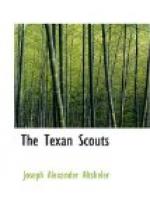He sank by and by into a stupor. He was remotely conscious that he was lying in a thicket, somewhere in boundless Texas, but it did not really matter. Cougars or bears might come there to find him, but he was too sick to raise a hand against them. Besides, he did not care. A million Mexicans might be beating up those thickets for him, and they would be sure to find him. Well, what of it? They would shoot him, and he would merely go at once to some other planet, where he would be better off than he was now.
It seems that fate reserves her severest ordeals for the strong and the daring, as if she would respond to the challenges they give. It seems also that often she brings them through the test, as if she likes the courage and enterprise that dare her, the all-powerful, to combat. Ned’s intense chill abated. He ceased to shake so violently, and after a while he did not shake at all. Then fever came. Intolerable heat flowed through every vein, and his head was ready to burst. After a while violent perspiration broke out all over him, and then he became unconscious.
Ned lay all night in the thicket, wrapped in the blankets, and breathing heavily. Once or twice he half awoke, and remembered things dimly, but these periods were very brief and he sank back into stupor. When he awoke to stay awake the day was far advanced, and he felt an overwhelming lassitude. He slowly unwound himself from his blankets and looked at his hand. It was uncommonly white, and it seemed to him to be as weak as that of a child.
He crept out of the thicket and rose to his feet. He was attacked by dizziness and clutched a bush for support. His head still ached, though not with the violence of the night before, but he was conscious that he had become a very weak and poor specimen of the human being. Everything seemed very far away, impossible to be reached.
He gathered strength enough to roll up his blankets and shoulder his rifle. Then he looked about a little. There was the same alternation of woods and prairie, devoid of any human being. He did not expect to see any Texans, unless, by chance, Fannin came marching that way, but a detachment of Mexican lancers might stumble upon him at any moment. The thought, however, caused him no alarm. He felt so much weakness and depression that the possibility of capture or death could not add to it.
Young Fulton was not hungry,—the chill and following fever had taken his appetite away so thoroughly,—but he felt that he must eat. He found some early berries in the thickets and they restored his strength a little, but the fare was so thin and unsubstantial that he decided to look for game. He could never reach Fannin or anybody else in his present reduced condition.
He saw a line of oaks, which he knew indicated the presence of a water-course, probably one of the shallow creeks, so numerous in Eastern Texas, and he walked toward it, still dizzy and his footsteps dragging. His head was yet aching, and the sun, which was now out in full brightness, made it worse, but he persisted, and, after an interminable time, he reached the shade of the oaks, which, as he surmised, lined both sides of a creek.




